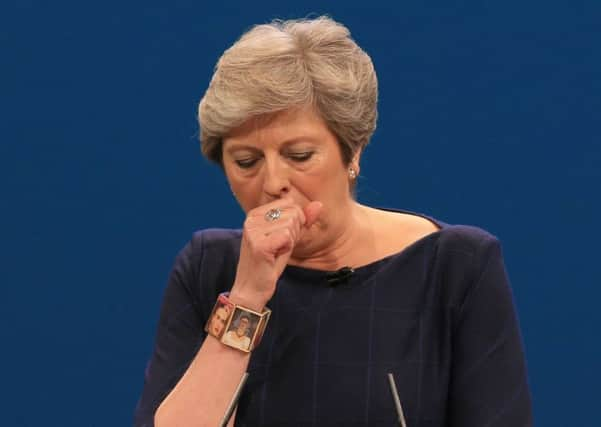Brian Wilson: Why Theresa May will cling on for a while yet


Straight-faced commentators have been anxious to remind us that politics is a “cruel business” or even an “unfair” one before going on to be cruel and unfair. There is no great logic to it. Mrs May can hardly be held responsible for a collapse in her own security, the disintegration of her backdrop or the cough which afflicted her.
Yet, put them together and she is at severe risk of crossing that dangerous line for any politician between being laughed at, rather than laughed with. Months of mishaps, including an unnecessary General Election which also went wrong, have not left a great well of support to draw on outside the Tory conference hall, or perhaps even inside it.
Advertisement
Hide AdAdvertisement
Hide AdYou never know how things will play out in the court of public opinion and, after the laughter died down, there was probably a lot of sympathy which may work to the Prime Minister’s short-term advantage. It is more difficult to attack her for failing to give leadership when any attempt to do so was thwarted by something as non-ideological as a cough.
The word “unlucky” tends to attach itself to the Prime Minister, yet in one crucial respect she is extremely lucky – if hanging onto office in current circumstances is indeed a symptom of good fortune. Mrs May’s luck lies in the fact there is no obvious successor, no Michael Heseltine awaiting the call or even a John Major around whom consensus could be built, though he soon got fed up with the warring factions.
Some – like the P45-bearing comedian – may say Boris Johnson upsets that assumption, to which I would reply: “You can’t be serious”. Whatever the problems of the Government at this juncture, they would shrink into insignificance if the Tories headed in that direction and I am pretty sure the vast majority of them understand that. Those who don’t might usefully have heard a superb interview conducted by Eddie Mair on the PM programme. He was talking to the Home Secretary, Amber Rudd, and – having got Mrs May’s conference travails out of the way – turned to the question of why Johnson remained in office. “Do you think people want Bernard Manning as Foreign Secretary?”
While Mair concentrated his questioning on Mrs May’s judgement in retaining Johnson, it was not difficult to see how the focus would change if there was any prospect of him becoming PM. The jolly quip that the beleagured Libyan city of Sirte could become another Dubai – “all we have to do is clear away the dead bodies” – was the latest in a long line of grossly offensive pronouncements to add to his baggage.
The most interesting aspect of these exchanges was that Ms Rudd, to her credit, found the indictment unanswerable.
“I am not going to be drawn down the Boris vortex”, she replied which ranks low in the hierarchy of endorsements from one senior Cabinet Minister for another.
When a clip from a Libyan ally described Johnson’s words as showing “no respect for the young Libyans who died”, Rudd’s embarrassed silence spoke volumes. Can this go on?
I imagine the Scottish Tories, who have ploughed their own furrow with some success under Theresa May, would regard the further elevation of Boris Johnson with something approaching horror. One bungle in the broadcasting studios could undo years of progress. I suspect the same apprehension would be felt in Tory circles outside a very small London radius.
Advertisement
Hide AdAdvertisement
Hide AdThe field will duly sort itself out but my guess is that Mrs May is safe for a while yet – which takes us onto the question of what she does next. Brexit dominates and the overwhelming desire, in Scotland as much as anywhere, is to see a pragmatic approach to critical areas of negotiations which are neither elongated unnecessarily or curtailed by an artificial time barrier. That is the principal test by which she and her government will be judged in the months ahead.
In between the lozenges, there were a couple of announcements of genuine importance.
First, there was the commitment to spend a couple of billion extra on housing. If that priority results in extra Barnett money for the Scottish Government, I suggest it should go straight into the fight against homelessness.
According to Shelter Scotland, rough sleeping has increased by ten per cent in the past year, while 3250 Scottish families are living in temporary accommodation. These issues are capable of being addressed.
The other big announcement involved a price cap on energy bills. This one has been switched on and off in the past and the fine print of legislation, once the utility company lobbyists have got to work, will be critical.
In the meantime, however, the language used by Theresa May should cause some soul-searching in the Perth headquarters of SSE – or perhaps that is being optimistic.
Mrs May attacked the “broken energy market” which “punishes loyalty with higher prices and the most loyal customers are often those with lower incomes”. What is actually delivered through the promised legislation will be closely observed.
Six months from now, Mrs May’s cough will have been largely forgotten while what people pay for gas and electricity will be a continuing guide to her government’s credibility.